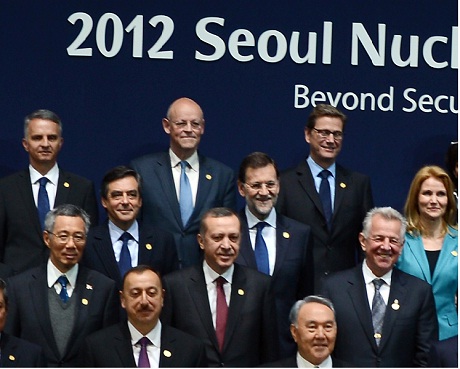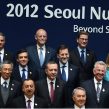
Presidents of Kazakhstan, Armenia, Azerbaijan and Georgia Attend Seoul Nuclear Summit
Publication: Eurasia Daily Monitor Volume: 9 Issue: 64
By:

Several Eurasian leaders were among the 54 heads of state, deputy prime ministers, or foreign ministers who attended the March 26-27 Nuclear Security Summit in Seoul, South Korea. The main objective of the summit was to prevent non-state actors such as terrorists or criminals from acquiring dangerous nuclear materials, a constant worry in the post-Soviet space due to the legacy of the USSR’s massive nuclear weapons program.
A highpoint of the summit was the trilateral announcement of the Kazakhstan-Russian-US initiative to enhance the security of the former Semipalatinsk nuclear test site in eastern Kazakhstan (government.kz). Although the site was closed in 1991, scavengers were collecting some of the radioactive materials at the site. The secret trilateral effort to clean and secure the site was launched in 2004, and is nearly completed.
The announcement was a major element in the effort, supported by the United States and other countries, to showcase Kazakhstan as model non-proliferation actor whose policies should be followed by Iran and other countries with nuclear-related production capabilities. At the summit, President Barack Obama praised “the outstanding leadership of President Nazarbayev and the people of Kazakhstan” for their contributions to global nuclear materials security (www.government.kz, March 27). In his meeting with Obama, Nazarbayev thanked the United States for its assistance with this effort and encouraged small- and medium-sized US businesses to invest in Kazakhstan’s innovation and technology sector (Novosti-Kazakhstan, March 27).
Kazakhstan’s national statement submitted to the summit reviewed how the country had eliminated a volume of highly enriched uranium (HEU) and plutonium sufficient to manufacture almost 800 nuclear weapons. This material had been produced as spent fuel by the world’s first fast breeder reactor, Kazakhstan’s BN-350. Kazahstani authorities are also downblending 33 kilograms of HEU into low-enriched uranium (LEU) for the nuclear fuel plant in Ust-Kamenogorsk.
In July 2011, Kazakhstan applied to host the first IAEA international LEU nuclear material fuel bank (EDM, March 9). Kazakhstan is also cooperating with several foreign countries as well as the IAEA to strengthen the physical security of its other nuclear facilities (www.thenuclearsecuritysummit.org, March 26). The country is the world leader in uranium ore extraction (EDM, March 27).
Another element of this effort was Nazarbayev’s March 25 op-ed in the New York Times on “What Iran Can Learn From Kazakhstan.” Recalling how Kazakhstan has prospered since renouncing the nuclear weapons capabilities it inherited from the Soviet Union, the author wrote that, “Kazakhstan has used its close diplomatic relations with our neighbor across the Caspian Sea to urge Tehran to learn from our example.” The commentary also called for more nuclear-weapons-free zones and other nonproliferation measures (https://www.nytimes.com/2012/03/26/opinion/what-iran-can-learn-from-kazakhstan.html).
Azerbaijani analysts cited the presence of President Ilham Aliyev at the summit as demonstrating Azerbaijan’s international status (www.news.az/articles, March 27). The country had not been invited to the first summit but successfully lobbied to attend the Seoul gathering. In addition to highlighting Azerbaijan’s contributions to nuclear materials security, Aliyev criticized Armenia’s Nuclear Power Station at Metsamor in his speech at the summit, claiming that “It does not meet modern standards and is located in a seismic zone” (AzerTAc, March 27).
In his speech, Armenian President Serzh Sargsyan noted that, following the first Nuclear Security Summit in April 2010, Armenia enacted new legislation on controlling the export and transit of dual-use goods, including nuclear and radioactive substances (https://www.news.az/articles/armenia/57045). The country’s national statement further reviewed how Armenian experts were working with the United States and the IAEA to develop a draft law on registering and controlling nuclear materials (www.thenuclearsecuritysummit.org, March 26).
President Mikheil Saakashvili of Georgia used the opportunity for side meetings at the summit to hold talks before its formal opening with President Obama, European Council head Herman Van Rompuy, South Korean President Lee Myung-bak, President of Finland Sauli Niyniste, Turkish Prime Minister Recep Tayyip Erdogan, the prime ministers of Norway and Thailand, as well as with foreign ministers of Sweden and Germany (www.president.gov.ge, March 27).
In his summit presentation, Saakashvili noted how both Georgia and South Korea suffered from being divided countries. He warned about the danger of illicit nuclear trafficking in Georgia’s breakaway territories of Abkhazia and South Ossetia due to their status as “gray zones” under international law (www.president.gov.ge, March 27). The Georgian government’s National Progress Report to the Summit reviewed the various measures it had taken to secure nuclear materials in the territory under its direct control (www.thenuclearsecuritysummit.org, March 26).
In his press conference after the summit, Saakashvili told journalists that he had secured pledges of several hundred million dollars of investment in his meetings with South Korean business executives (www.president.gov.ge, March 29). Saakashvili saw opportunities to develop air transportation links and sell Georgia wine to Asia. He also noted how Georgia’s participation at the summit, despite his country not having a domestic nuclear industry, had “symbolic political meaning and it clearly indicated the regional significance of Georgia.” The South Korean government said it would soon open an embassy in Tbilisi (www.president.gov.ge, March 29).
Even those former Soviet republics that have no fissile materials expressed support for the summit’s goals. Their participation in Seoul underscored the fact that any country can fall victim to – and help prevent – incidents of nuclear trafficking or even the use of nuclear devices on its territory.




